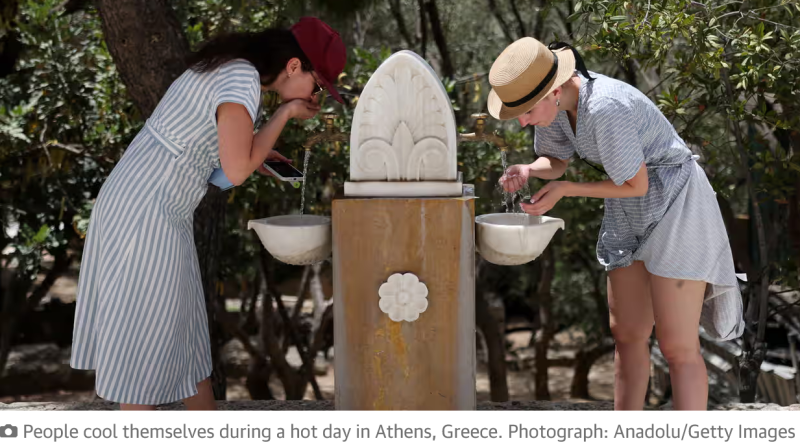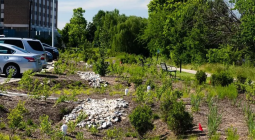‘It’s about survival’: Athens mayor focuses on getting capital through extreme heat

Trees, cooling centres, water stations. All three are on Haris Doukas’s mind as he sits in his office-turned-control centre on the top floor of city hall.
Barely six months into the job, the mayor of Athens’s top priority is simple: ensuring that the people of Greece’s capital – mainland Europe’s hottest metropolis – survive the summer. After a June that was the hottest on record, the greater Attica region has already witnessed record-breaking temperatures and wildfires.
“In any place tackling such extreme weather phenomena would be difficult,” says Doukas. “In a city of seven hills and such dense urban development it’s especially complex.”
Which is why Doukas is so preoccupied with the planting of trees.
“A green neighbourhood can experience a drop in temperatures of 5%, the difference between a tortuous day in a heat wave or not,” says the mayor, who was a political unknown teaching energy policy at Athens’ Polytechnic before being fielded for the post by the social democrat Pasok party.
“It’s not a matter of lifestyle, or improving the quality of life; it’s about survival when 23% of the green lung around Athens has in recent years been destroyed by fires. It’s vital we have more trees, more air-conditioned community centres and more water stations on our streets and squares.”
Doukas is no newcomer to the climate crisis or the perils it poses.
“The best thing about this job is that you can improve peoples’ lives,” says the 44-year-old. “It’s no longer about theories but about making Athens more sustainable and resilient.”
But he has no illusions. “Of course I’m worried … We’re doing whatever we can.”
Last week Greece’s prime minister, Kyriakos Mitsotakis, whose centre-right government has invested heavily in a “war chest” of fire-fighting equipment, including early detection drones, warned this summer was “expected to be particularly dangerous”. After days of fire fighters battling blazes fuelled by hotter, drier and windier weather – the tell tale signs of climate change – it was, he said, clear that “the most difficult times” lay ahead.
With temperatures nudging 40C in mid-June, and meteorologists predicting the mercury will be “six degrees celsius above normal” for the rest of July, Athens’ city hall has opened air-conditioned public spaces, set up a 24-hour “heatwave line,” reinforced staff at municipal clinics and extended a home care support programme that sees social workers, nurses and psychologists dispatched to the apartments of elderly people living alone. Under a pilot scheme monitoring the effects of heat on the older generation, seniors have been given biometric watches that, if needed, can alert authorities.
“Greece has an ageing population that is, and will be, more vulnerable to the heat,” says Olga Dourou, the vice mayor in charge of the programme whose study of active ageing at PhD level is also being put into practice by the municipality. “People are now living longer and we’re going to have to take measures to deal with it.”
Such steps are a world away from the youth of Efi Petropoulou and Rena Papadaki, retirees for whom memories of Attica’s once famously dry climate are still vivid. “The atmosphere in Athens has really changed,” says Petropoulou. “It’s so heavy and humid and it’s definitely got a lot hotter. Before you’d cope by closing the shutters and putting on the fan. Now it’s impossible without air-conditioning.”
“And who’d have thought we’d come to this?” her friend, Papadaki, chips in, pointing to the air conditioning unit at the neighbourhood “friendship club” where the two septuagenarians convene daily.
The club is one of seven community centres in central Athens that the municipality has opened to protect and shelter people when heat waves strike.
“Most get here by 9am when the doors open and leave at 9pm when they close again,” says Aliki Kirmitsa who lives in Neos Kosmos, a blue-collar area of post-war apartment blocks where the centre is located. “It’s a blessing. People like us in the third age would struggle without it. After all, who can afford to keep the air conditioning running around the clock?”
Greeks who might never have talked about the weather – or at least have faced it with a nonchalance bordering on stoicism – today follow it in real time on mobile telephone apps often shaking their heads in disbelief.
Recently Dimitris Dimitras, a waiter in Plaka, the picturesque district beneath the Acropolis, was among those cursing at the humidity that was making it especially hard to work.
“Look at this, these humidity levels, we could be in Indonesia,” he says, pulling out his phone. “I’m 61 and the heat really bothers me now … if it goes on like this there’ll be nobody waiting tables.”
Ever more Greeks are choosing to holiday in northern climes, with Norway and other parts of Scandinavia becoming increasingly popular. “All our flights are fully booked,” says Frosso Stavraki at the Cosmorama travel agency, which specialises in tours to northern Europe. “When it’s so hot people are looking for somewhere cool, authentically cool.”
Back in his office at city hall, Doukas says his aim is to plant 5,000 trees by the end of the year – 25,000 by the end of his term – to help reduce pollution, lower temperatures and improve the quality of air.
It’s a tall order but he’s determined. “I follow our new tree app on my phone every day,” he says, pulling it up on his mobile screen.
“At 11%, the green space in Athens is well behind the European average … with this I can see exactly where and when new samplings have been planted. Here it’s the way forward.”






